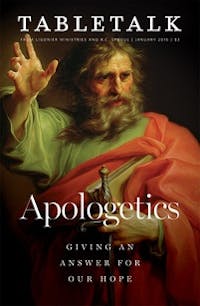
Request your free, three-month trial to Tabletalk magazine. You’ll receive the print issue monthly and gain immediate digital access to decades of archives. This trial is risk-free. No credit card required.
Try Tabletalk NowAlready receive Tabletalk magazine every month?
Verify your email address to gain unlimited access.
How important is your pastor’s training? If we believe in having ministers who preach, teach, and relate to the varied and many needs within our congregations, thorough training, as with any profession, is indispensable. Yet, for a variety of reasons, in the eyes of some Christians, theological education is at best negotiable and at worst dispensable. Some argue that Jesus’ disciples, despite not having had a theological education, became the most effective communicators of the gospel ever, just from having been “with Jesus.” So, accordingly, it follows that theological education is an unnecessary complication that gets in the way of the church’s real progress. Besides, in many places where churches are becoming weaker and less able to provide funding for seminary training, it is being suggested that preparation should be reduced to only “the essentials.” Others tell us that, in a post-Christian world dominated by secular resistance to the church, we need to “just get out there,” the implication being that seminaries are largely irrelevant.
Yet, when we think about what the church is and what we expect from Sunday worship, the ministry of the Word lies at the core. It follows, therefore, that if pastors are expected to meet the expectations of their people and fulfill their calling, they must know the Bible thoroughly and be able to communicate its truths skillfully. Furthermore, if we believe that mission is making disciples of all nations, as Jesus taught, then as the church goes out with the gospel, we must be grounded in biblical doctrine as well as equipped to communicate it. Interestingly, New Testament mission always included the substance of the faith as well as a presentation of the cross and an invitation to believe. Indeed, the first official mission to which the Apostle Paul was called was not to confront an unbelieving world with the cross but to teach the church in Antioch after they had come to faith (Acts 11:26).
The right kind of training will first of all provide students with the tools that they need to become thoroughly acquainted with the Scriptures. This includes a familiarity (to a greater or lesser degree) with biblical languages (Old Testament Hebrew and New Testament Greek). Then, a good seminary will have, at its heart, the kind of theological teaching in which students will engage with major biblical doctrines. As the Bible points us upward to God, a grasp of systematic theology will, by piecing together the biblical data, bring us to a proper understanding of God’s attributes: His being, power, knowledge, and holiness. As the Bible points back to the cross, theology will seek to explore central issues such as sacrifice, atonement, reconciliation, purification of sin, and justification. As the Bible commands the church to move out with the gospel, a historical and theological perspective will force us to ask how God has guided the church over two thousand years, what the gospel is, and how it can best be communicated. In addition, pastoral and practical theology will introduce students to a wide variety of contemporary issues that ministers are likely to meet in everyday church life.
It is a serious mistake to assume that past challenges in the church can’t reappear, albeit in a different variant. Is the resurrection of Jesus a myth? Can we really believe that miracles happened? What do we mean by the Bible’s being God’s inerrant and infallible Word? Today’s church wrestles with whether Adam was a real historical person and the denial of penal substitution in the death of Christ. These issues deserve thorough, rational exploration that can only be undertaken from a knowledgeable theological perspective.
When it comes to relevance, our seminaries must never become merely academic institutions. Instead, a live connection to churches should be maintained in which churches’ needs and challenges can be understood. In addition, students have to be made aware of trends in cultural thinking so that they can be trained in how to communicate the Bible in today’s language in today’s world without compromising the message of God’s Word.
To effectively reach today’s skeptical unbelievers does not mean less theology. If anything, it means more. If we believe that mankind in every generation has the imprint of God upon his soul, we should expect people, in responding to the gospel, to engage in a process of rational questioning about the content of the Christian faith in all its complexity.
A truly healthy church is one in which its members are theologians, coming to church each Sunday with a readiness to think and learn, with an insatiable appetite for more. A good pulpit ministry will richly edify God’s people. It is fatal to underestimate the perceptiveness of our congregations. As people discover what it means to follow Jesus, the intellect often comes to life and the gospel produces a hunger for knowledge that a pastor should be well equipped to satisfy.
To suggest that today’s pastors do not need rigorous seminary training because the disciples did not have it is a spurious argument. Their time with Jesus was a three-year intensive course, complete with internship and testing, and in which they discovered the Scriptures as never before. If the church in the twenty-first century is to thrive, it will depend on high-quality pulpit ministry and well-equipped pastoral skill. If training for the ministry comes at a high price, it is worth it. The church cannot afford otherwise.
